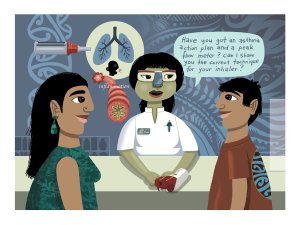Academic pharmacist Nataly Martini discusses the medical management of asthma in adults and adolescents, which has evolved to prioritise early anti-inflammatory treatment. She also explains how to improve patient outcomes by proactively identifying poor asthma control and supporting equitable access to education and treatment
New use found for old diabetes medicine, pointing the way to improved outcomes in hepatitis B treatment
New use found for old diabetes medicine, pointing the way to improved outcomes in hepatitis B treatment

Work by pharmaceutical scientists in Japan has found that the thiazolidinedione troglitazone inhibits internalisation of hepatis B virus (HBV). “Current anti-HBV agents, including nucleoside analogues and interferons, can reduce viral load, but are not generally curative. Thus, the development of anti-HBV agents with different modes of action is required to improve treatment outcomes,” said Kento Fukano of the National Institute of Infectious Diseases, Japan.
The research was presented at the Pharmaceutical Sciences World Congress, which was held online this week by the International Pharmaceutical Federation (FIP). “Virus internalisation into host cells is the initial step of infection, which means that this compound could be used for post-exposure prophylaxis. However, as viral entry is also essential for the initiation, spread and maintenance of viral infection, troglitazone is also a potential treatment for chronic hepatitis B,” Dr Fukano explained.
In addition, a mechanism of action has been identified: troglitazone was found to clearly impede the oligomerisation of NTCP (sodium taurocholate cotransporting polypeptide), which is an entry receptor. “These results suggest that the oligomerisation of NTCP has potential to regulate HBV internalisation and it can serve as a new target for the development of anti-HBV agents,” Dr Fukano added.
According to the researchers, troglitazone is the first small molecule that has been shown to act in this way, potentially expanding the landscape of treatment options. “Hepatitis B immunoglobulin (HBIG) is a human-derived antibody that can neutralise infection. It is currently the only entry inhibitor to have obtained approval for treatment, but its use is limited by cost and supply issues as HBIG is obtained from vaccinated human donors. In contrast, troglitazone is cheap, we can maintain a more stable supply, and it can be administered orally, which is an advantage for developing countries with scarce medical resources,” Dr Fukano explained.





